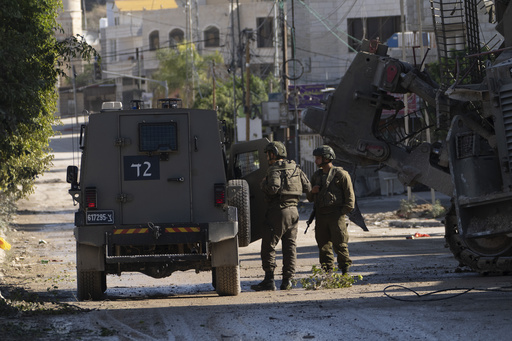
JERUSALEM — Tragic news has emerged from Gaza, where a three-week-old baby girl succumbed to the extreme cold overnight. Her death occurred amid heightened tensions as both Israel and Hamas blame each other for hindering ceasefire negotiations, which aim to end the ongoing war that has persisted for 14 months.
The infant was the third baby to lose her life to chilling conditions in recent days, highlighting the dire situation faced by many in Gaza. As a result of Israeli military operations, hundreds of thousands of Palestinians have taken refuge in precarious tent camps, often lacking sufficient shelter against the elements.
Israeli airstrikes and ground offensives have led to the deaths of over 45,000 Palestinians, with the majority comprising women and children, according to reports from Gaza’s Health Ministry. This figure does not differentiate between combatants and civilians. The relentless military actions have resulted in significant devastation, displacing approximately 90% of Gaza’s 2.3 million inhabitants, who are often forced to relocate multiple times. As winter descends, the situation grows graver, with hundreds of thousands crammed into makeshift camps along the coast, battling shortages of essential supplies like warm clothing and blankets.
Despite Israel increasing the aid flow into the territory, permitting around 130 trucks daily this month compared to 70 in previous months, the amount is still substantially less than required. Various humanitarian organizations express concerns that they cannot distribute over half of the delivered aid due to restrictions imposed by Israeli forces and rampant theft issues within Gaza.
Sadly, Mahmoud al-Faseeh, the father of the deceased infant named Sila, recounted how he attempted to keep her warm by wrapping her in a blanket within their unsealed tent in the Muwasi area, close to Khan Younis. He revealed that the temperatures dropped significantly to 9 degrees Celsius (48 degrees Fahrenheit) that night, making it unbearable even for adults.
Throughout the night, Sila woke up crying multiple times, and by morning, her family found her unresponsive, lifeless, with her body rigid. “She was like wood,” Mahmoud stated, expressing heartbreak over his daughter’s condition. Despite rushing her to a nearby field hospital where medical staff attempted resuscitation, it was too late, as she had already suffered severe lung damage. Medical professionals confirmed that Sila died due to hypothermia, with reports of two other infants having similarly succumbed to the cold in recent days.
As the humanitarian crisis deepens, ceasefire talks remain fraught with complications. Israel and Hamas have engaged in a war of words, both accusing one another of impeding progress toward an agreement. For weeks, there have been indications of a burgeoning deal that could see numerous hostages released. However, new contentious issues have arisen regarding the terms of such an agreement, including conditions tied to the release of hostages and the withdrawal of Israeli defense forces from Gaza.
Hamas claims that Israel has introduced additional demands concerning the return of displaced individuals, which is stalling the negotiations. In contrast, Israeli officials contend that Hamas is failing to adhere to previously established points of agreement. Despite these challenges, both factions continue to engage in dialogues.
Following a recent trip to Qatar for discussions, Israel’s negotiating team, which includes officials from intelligence and military sectors, has returned for internal reviews. On October 7, 2023, Hamas and associated groups took around 250 individuals hostage during assaults on southern Israel. A prior truce in November led to the release of more than 100 hostages, while efforts to rescue others continue. Currently, around 100 hostages are believed to remain in Gaza, with at least a third thought to have perished either during the initial attack or while in captivity.
Amid these negotiations, families of the hostages express escalating frustration, urging the Israeli government to pursue a ceasefire swiftly. Recently, they held an emergency press conference advocating for a cessation of hostilities, emphasizing that each passing moment increases the risks to their loved ones.
The situation escalated further with missile activity from Yemen’s Iran-backed Houthi rebels, which triggered air raid alerts across central Israel. The Houthis claim their operations target Israeli locations such as Jaffa and Ashkelon. Israeli Prime Minister Benjamin Netanyahu has warned that threats against Israel will be met with decisive action, while the government has sought an urgent meeting of the U.N. Security Council regarding these attacks.
Israel’s U.N. representative has stated that they anticipate a strong condemnation of the Houthi assaults and called for accountability toward Iran, which backs the Houthis.

